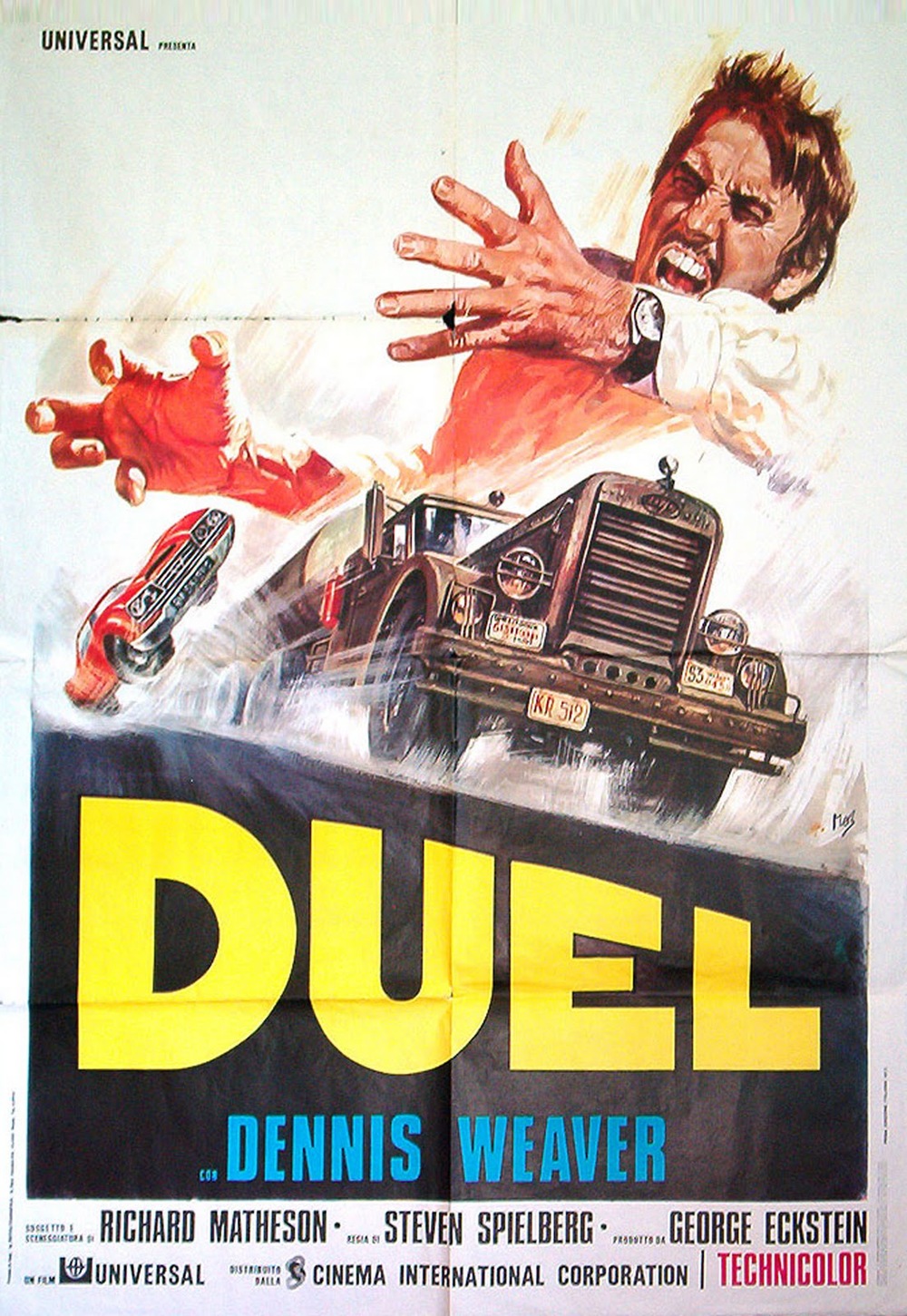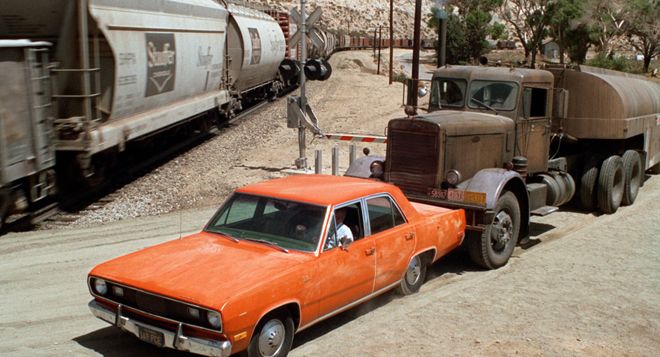Steven Spielberg's 1971 film Duel, is a film designed to fully entice a viewer, cramming huge amounts of tension into just over 90 minutes and filling any gaps with thought provoking social commentary. The film follows the story of David Mann (Dennis Weaver) a modern day man travelling across a dusty American highway, with intentions to reach a business meeting.
However, even with Mann's 'high wired metropolitan state of mind' intact, it serves as little use to him when he is confronted with an angry driver, who very quickly begins to play the role of a faceless, diesel injected metallic goliath, hell bent on taunting and antagonising Mann. Even after Mann's best efforts to shake the tailgating bully, he remains unsuccessful and the apex predator of the roads continues to cause chaos and anonymously corrode Mann's confidence and self esteem, ultimately leaving him as a shivering wreck. After nail biting chases, countless close calls and a number of western inspired stand offs, Mann finally rids the roads of the lunatic and sends him to the bottom of a canyon at the sacrifice of his own vehicle. This makes for a stunning sequence and a beautiful closing shot, revealing Mann as a shattered and internally defeated character. Throughout the intense chases and vehicular jousting, Spielberg beautifully litters moments of the film with subtle social commentary and dialogue that hints at the real intention of the piece, suggesting that the drama and action are all personifications of this modern day mans internal battle with inferiority and loss of power.
However, even with Mann's 'high wired metropolitan state of mind' intact, it serves as little use to him when he is confronted with an angry driver, who very quickly begins to play the role of a faceless, diesel injected metallic goliath, hell bent on taunting and antagonising Mann. Even after Mann's best efforts to shake the tailgating bully, he remains unsuccessful and the apex predator of the roads continues to cause chaos and anonymously corrode Mann's confidence and self esteem, ultimately leaving him as a shivering wreck. After nail biting chases, countless close calls and a number of western inspired stand offs, Mann finally rids the roads of the lunatic and sends him to the bottom of a canyon at the sacrifice of his own vehicle. This makes for a stunning sequence and a beautiful closing shot, revealing Mann as a shattered and internally defeated character. Throughout the intense chases and vehicular jousting, Spielberg beautifully litters moments of the film with subtle social commentary and dialogue that hints at the real intention of the piece, suggesting that the drama and action are all personifications of this modern day mans internal battle with inferiority and loss of power.
 |
| Fig 1: Duel, Poster |
Duel serves as an extremely fast paced film, where there appears to be a very limited amount of time for unnecessary dialogue or small talk and a real necessity to deliver the punch of the story, possibly hinting towards Spielberg's thoughts and connotations on modern day life in that era and it's fast paced nature that has turned formerly primitive creatures into hard working drones with a desire to succeed and accomplish. Nigel Honeybone describes Duel as "a text-book example of the Monster Movie" (Honeybone, 2011), which is interesting as obviously the truck isn't instantly recognisable as a typical Hollywood monster like those featured in films such as King Kong (1933) or Godzilla (1954), suggesting that Spielberg was well aware he was creating a metaphorical enemy rather than a purely physical one. Duel could almost serve as one giant filmic metaphor describing the working day of a modern man, suggesting that the intimidating beast that follows David Mann is a personification of the anxiety and stress that drives an every day worker towards depression and can ultimately leave a person in complete turmoil. This idea slowly begins to solidify when certain aspects of the film are taken into account, for example the fact that the film starts with Mann's car leaving his family homes garage and setting off into the city, much like any modern day worker's would do, and finally ending with Mann left as a quivering and dishevelled mess because of the stress and pressure of the events of the day. This all points towards the idea that Spielberg was ultimately demonstrating to an audience the effects of modern day working life and working under the pressure of an aggressive and persistent hierarchy can have on a person. After this is taken into account, the background noise of the radio suddenly becomes so much more than just obvious digs at the macho persona and becomes more about the trouble any outside influence can add upon the mind of an already pressurised worker. These minuscule moments of the male persona being jabbed at seem to serve as Spielberg's way of showcasing his ideas on the personal effects media can have on a person. We can also see this mirrored in modern day life, with the growing idea of male and female beauty being something that the majority worry about today, when really it should serve as such a small aspect of modern day life when one considers the bigger picture of civilisation. It is also worth noting that the only real character that a viewer connects with is David Mann, which seems to suggest that Spielberg's intentions are to make the audience focus on him and become part of this mans life, which corresponds with the fact that even from outside of his vehicle his radio is audible making the viewer feel as if they are within Mann's car at all times, becoming part of this metaphorical daily routine.
 |
| Fig 2: Duel, Screenshot |
Along with all those unspoken metaphors and jabs, there is one scene that seems to serve a bigger role than first thought, the scene in which Mann stops at a gas station and is attacked by the malicious truck which releases a number of pet snakes and other caged dessert dwellers. This sequence leaves these reptilian creatures free of their caged habitat, this could be seen as a huge metaphor for modern day life, hinting at the relentlessness of a boss type figure and their possible disregard for problems and lives that don't fall directly at their door, or possibly the idea that these caged animals are in fact serving as metaphorical modern day humans and the boss type figure has come to detach them from their quiet lives and enrol them into the positions of workers within the modern world. Duel is filled with so many little moments like this, leading the viewer to believe that scenes could potentially appear to be more than they seem when looked at in this hierarchical context. The scene in which Mann attempts to free a school bus filled with children from a ditch shows him failing, only to be upstaged by the tormenting truck when it manages to easily move the bus. This is possibly hinting at the idea that the character of Mann plays the role of an inferior being that cannot successfully support a family and his patronising superiors could easily play his role better than him, which forces Mann to continue to play the part of the struggling lesser figure.
As Duel continues, the chases and action become ever more enveloping and the villain of the piece, the persisting truck, seems to take on a more animalistic role rather than serve as a simple rusted vessel for an angry driver. The truck itself becomes almost predatory, prowling its territory and ridding the land of any unwanted intruders that cross its path. In fact, the scenes that involve chases are almost reminiscent of the scene from Lion King (1994) where the three hyenas toy with the lion cubs before attempting to kill them because they have entered their land. Ian Freer states "Not only is the vehicle never ascribed a simplistic motivation (like the shark or velociraptor of future Spielberg hits, it simply exists to kill) but the driver is never ever revealed. Tension and terror, not characterisation and plot, are what matter here." (Freer, 2015). It doesn't give the impression that the trucks intention is ever really to kill Mann, but more torment him, causing him to breakdown and leave him as a damaged man, perhaps hinting towards a working mans perspective of the superior figures in their lives and their views on a dominant characters intentions.
 |
| Fig 3: Duel, Screenshot |
Duel certainly feels as if it serves two purposes, firstly to stand alone as a fast paced and compelling thriller, secondly, to send a powerful message to gripped audiences that would, at the time, be part of a huge social and political movement. With its fast paced action and very minimal plot line, it is up to each individual viewer to decide what the true story of Spielberg's masterpiece is. Whether it be social commentary or the simple notion of a thrilling car chase. Following the release of Duel, reviews were stating that it "looks like the work of an unusually talented young director" (Maslin, 1983), proving that Spielberg's potential was seen by others very early on in his career, potential that was undoubtedly giving the now legendary director, well deserved attention. Duel is a film that Spielberg will truly be remembered for, along with his other gigantic cinematic creations, leaving audiences stunned and more importantly, engaged.
Bibliography
Freer, Ian, 2015, Empire Essay: Duel Review, http://www.empireonline.com/movies/empire-essay-duel/review/ Accessed on: 02/02/2016
Honeybone, Nigel, 2011, Film Review: Duel (1971), http://horrornews.net/42926/film-review-duel-1971/ Accessed on: 02/02/2016
Maslin, Janet, (1983), Duel (1971) 'Spielberg's Duel' Four Wheel Combat, http://www.nytimes.com/movie/review?res=9804EFD81138F936A25757C0A965948260 Accessed on: 02/02/2016
Illustration List
Fig 1: Movie Poster, Duel, http://geektyrant.com/news/10-fun-facts-about-steven-spielbergs-duel Accessed on: 02/02/2016
Fig 2: Screenshot, Duel, http://www.homecinemachoice.com/news/article/steven-spielberg-director's-collection-review/19975 Accessed on: 02/02/2016
Fig 3: Screenshot, Duel, http://www.denofgeek.com/movies/14999/steven-spielbergs-duel-an-appreciation Accessed on: 02/02/2016

Nice! A long, engaging and considered review, Lewis! So sorry about the glitching of the DVD player - grrrr!
ReplyDeleteThanks Phil! I thought the film was brilliant!
ReplyDeleteExcellent - I really enjoyed reading this review Lewis :)
ReplyDeleteThank you Jackie :)
ReplyDelete